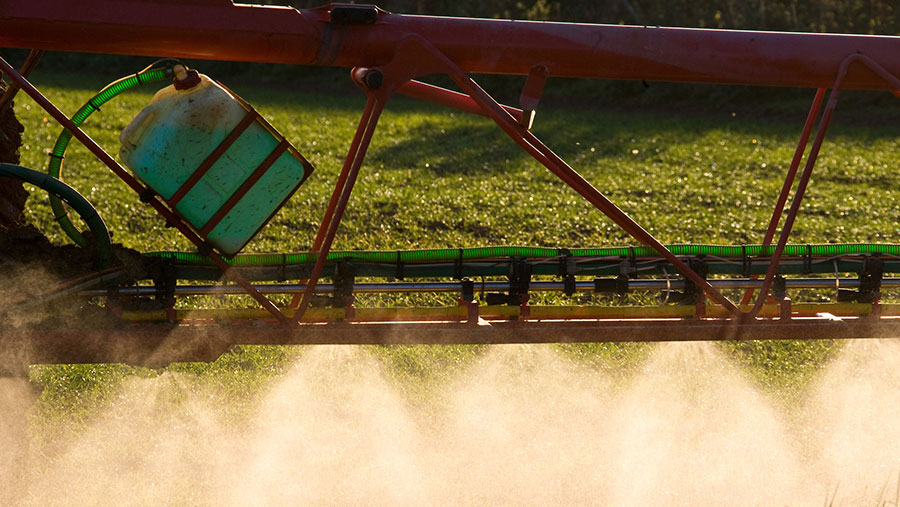Pesticide standards ‘could drop to compete with cheap imports’
 © Tim Scrivener
© Tim Scrivener UK farmers could be forced into ramping up pesticide use to compete with cheap food imports after Brexit, according to a report.
Authored by Pesticide Action Network UK (Pan UK), Sustain and trade expert Emily Lydgate, Toxic Trade (PDF) warns that the country’s pesticide standards could be slashed in new trade deals, threatening public health and the environment.
The UK currently has some of the most stringent pesticide regulations in the world, meaning that many agricultural products produced elsewhere can’t be sold here.
See also: Opinion: Why alternative pesticides are set to become mainstream
However, concern is growing that in the wake of the UK’s exit from the EU, trade deals currently under negotiation with the US, and planned imminently for Australia and India, will drive down UK pesticide standards.
Vicki Hird, farm campaign co-ordinator at Sustain, said the lowering of pesticide standards could be “catastrophic” for UK farming and the environment.
She added: “If UK farmers are forced into using pesticides in order to compete with a flood of cheap food imports, their exports will no longer meet EU standards and they’ll lose one of their key markets. Sixty percent of UK agricultural exports currently go to the EU, so this could finish off many farming businesses.”
Key recommendations for the UK government in the report
- Do not allow any weakening of UK pesticide standards via post-Brexit trade agreements.
- Protect UK farmers from being disadvantaged by cheap food imports produced using pesticides, and maintain current pesticide standards so they can continue exporting to the European Union.
- Preserve the UK’s power to exercise its right to continually strive for higher levels of consumer and environmental protection.
- Ensure that trade agreements are developed in the open with the opportunity for full democratic scrutiny.
Government pledge
The report calls on the UK government to prioritise human health and meet their stated commitment of “leaving the natural environment in a better state than we found it”.
It also highlights the human health concerns if the government opens up the market to cheap food imports, many of which are produced using pesticides banned here.
For example, chlorpyrifos has been shown to negatively affect the cognitive development of foetuses and young children and is banned from use in the UK, but is used by farmers in the US and India.
Responding to the report, a spokesperson for the Crop Protection Association said: “As the report acknowledges, UK pesticide standards are amongst the strongest in the world. Government has been clear that there will be no reduction in environmental or human health standards post Brexit and our industry fully supports that.
“All plant protection products used in the US, Australia and the UK have been subject to rigorous safety testing to ensure they pose no unacceptable risk to human health and the environment. On average, it takes around 11 years and costs over £200m to bring a single crop protection product to market.”
Last month, the European Commission revealed plans to halve the use of chemical and “high-risk” pesticides by 2030 to halt the decline of pollinators. Green campaigners welcomed the proposal, but farmers warned it could damage crop yields.
Food standards petition
An NFU petition urging the government to introduce laws to ensure food imports meet UK production standards has received almost 1m signatures.
A UK government spokesperson said: “We have been clear we will not compromise on our high food and environmental standards, and we will only permit the use of pesticides where robust scientific assessment shows they will not cause any harm to people or the environment.”
Pesticides worth up to €94m in criminal profits seized
Illegal pesticides worth up to €94m (£84m)have been taken off the EU market so far in 2020, a study reveals.
Europol co-ordinated the fifth edition of operation Silver Axe, which saw twice the amount of illegal products seized compared with last year’s operation. The annual law enforcement operation, which targets the counterfeit and illicit trade of pesticides, took place between 13 January and 25 April and involved 32 countries.
Law enforcement authorities carried out inspections on land and sea borders, inland marketplaces and parcel deliveries, checking more than 3,000t of pesticides.
Altogether, 260 investigations were opened, two individuals arrested and 1,346t of illegal pesticides seized – enough to fill 458 Olympic-sized swimming pools. Eight investigations are ongoing in Belgium, France, Germany, Poland, Slovenia and Switzerland.
A European study estimates between 10-14% of the EU pesticide market is affected by this illegal trade and criminals netting up to €70 (£62) for every trafficked kilogram of illegal pesticides.
Some organised crime groups trafficking pesticides are also involved in other illegal activities, such as trafficking counterfeited cigarettes and illegally trading pharmaceuticals.

